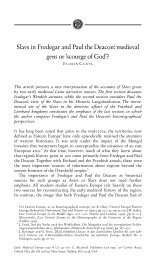A READER IN COMPARATIVE INDO-EUROPEAN MYTHOLOGY
A READER IN COMPARATIVE INDO-EUROPEAN MYTHOLOGY
A READER IN COMPARATIVE INDO-EUROPEAN MYTHOLOGY
You also want an ePaper? Increase the reach of your titles
YUMPU automatically turns print PDFs into web optimized ePapers that Google loves.
GREEK<br />
Many people think that Greek religion is thoroughly known and researched. After all, we<br />
have so many preserved temples from classical antiquity, we have detailed accounts of<br />
Greek mythology not only from Greek, but also from Roman sources, and we are familiar<br />
with the way the Greeks depicted their gods from thousands of preserved statues and<br />
pictures on Greek vases. Homer gave us vivid stories about the relationships of Gods and<br />
humans in his «Iliad» and «Odyssey», and the whole history of the gods and the universe<br />
is presented in Hesiod's «Theogony». We can also learn a whole lot about Greek's attitude<br />
to religion from the early lyrics and drama, especially from the solemn hymns of Pindar<br />
and the plays of Aeschylus and Sophocles.<br />
However, none of the works mentioned were actually recited or otherwise used in Greek<br />
temples during religious services. There is no Greek equivalent of the «Rig Veda», and we<br />
know virtually nothing about how the priests addressed their gods. Many ceremonies are<br />
known only from depictions on vases and scarce references in works of ancient authors.<br />
Indeed, many of the ceremonies were intended to be secret, so it is no wonder we can only<br />
guess what was actually going on during the «Eleusyne Mysteries», dedicated to<br />
Persephone. Only the initiated could participate in the mysteries, but the initiated at some<br />
point included the majority of the citizens of Athens. Other ceremonies are better known,<br />
especially those organized in Athens, such as the “Thesmophoria”, dedicated to Demeter,<br />
in which only women could participate, or the «Lenaia», dedicated to Dionysus.<br />
Moreover, the Greek mythology was transmitted to us mostly in late sources, especially in<br />
works of Hellenistic authors who sought to systematize and preserve ancient and halfforgotten<br />
traditions, such as Pseudo-Apllodorus' «Bibliotheca». We also have some<br />
accounts of Greek customs – including religious festivities – in the works of such authors<br />
as Herodotus (in his «Histories» from the 5th century BC) and Pausanias (in his<br />
«Description of Greece» from the 2nd century AD). We also have thousands of<br />
inscriptions, including laws and contracts carved into stone monuments, public decrees<br />
and decrees of religious associations. These documents often record names of ceremonies,<br />
priests and priestly families.<br />
Of all the cultic texts, we only have some fragments used in the Orphic mysteries, which<br />
became very popular in Greece in the 5 th centuyr BC and after. Especially numerous are<br />
short instructions to the soul of the dead, written on gold leafs, and fragments of Orphic<br />
poems. In this field there have been some interesting new discoveries, such as the famous<br />
Derveni Papyrus, found in 1962 but published only in 1997. It contains a commentary on<br />
a mythological Orphic poem.<br />
Our first written sources for the history of Greek religion are the tablets written in the<br />
syllabic Linear B script. These are almost exclusively lists of offerings to various<br />
sanctuaries (such as the sanctuary of Pa-ki-ja-ne near Pylos) and gods. Many theonyms<br />
found on the tablets are known from the classical period, e.g. Zeus, Hera (who appears to<br />
have been already worshipped as Zeus’s consort), Ares, Enyalios, Artemis, Paian (later<br />
Apollo), and, interestingly, Dionysos. There are, however, some theonyms that are<br />
unknown in later periods, e.g. the mysterious Drimios, son of Zeus, or the various female<br />
deities called po-ti-ni-ja (= pótnia ‘lady’), of which A-ta-na po-ti-ni-ja (the lady of Atana<br />
= Athḗnē) and Da-pu-ri-to-jo po-ti-ni-ja (the lady of the Labyrinthos) are prime examples.<br />
Items offered to the gods do not differ from those used in sacrifices in the classical period,



